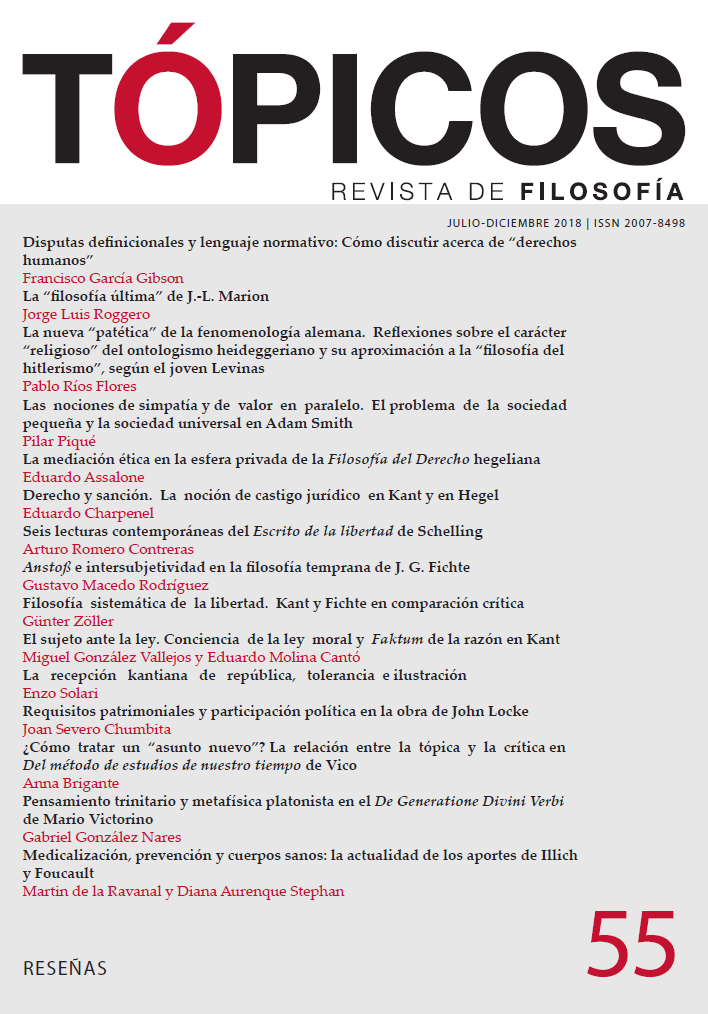Publicado 2018-06-08
Palabras clave
- Anstoß (impulso inicial),
- intersubjetividad,
- reflexión,
Cómo citar
Resumen
Anstoß e intersubjetividad son dos conceptos fundamentales a partir de los cuales Fichte explica la importancia de la exterioridad en la actividad del yo. En la presente investigación analizo estos dos conceptos centrales en la filosofía temprana de Fichte. Primeramente presento una nueva interpretación del término Anstoß y analizo la relación entre ambos conceptos. Después argumentaré que ambos conceptos forman parte de un proyecto general que consiste en mostrar el carácter holístico de la subjetividad. Se trata, grosso modo, de mostrar la coherencia y continuidad de estas dos líneas de argumentación a las que remiten los dos conceptos con miras al establecimiento de lo que Fichte mismo llamó “historia prágmática del espíritu humano”. La idea central de este artículo es mostrar que los dos conceptos son complementarios sin contradecirse, formando parte de un proyecto general en Fichte.
Referencias
- Principal
- Todos los escritos de Fichte aquí citados refieren a la edición completa de la Bayerischen Akademie der Wissenschaften, editada por Reinhard Lauth et. al., Stuttgart-Bad Cannstadt 1962:
- Grundlage der gesamten Wissenschaftslehre als Handschrift für seiner Zuhörer. 1794/95: Grundlage, GA I/.2
- Wissenschaftslehre nova methodo. Kollegnachsschrift K. Chr. Fr. Krause 1798/99: Wlnm NKr, GA, IV/3.
- Grundlage des Naturrechts nach Prinzipien der Wissenschaftslehre, 1797: Grundlage des Naturrecht GA I/4.
- Especializada
- Altman, M. (2010): “Fichte’s Anti-Hegelian Legacy” En: Fichte, German Idealism, and Early Romanticism. Eds. Daniel Breazeale y Tom Rockmore. Amsterdam: Rodophi.
- Breazeale, D. (1995): “Check or checkmate? On the finitude of the Fichtean Self” En The Modern Subject: Conceptions of the Self in Classical German Philosophy. Eds. Karl Ameriks and Dieter Sturma. New York: SUNY Series in Contemporary Continental Philosophy, State University of New York, 87-99
- Claesges, Ulrich (1974): Geschichte des Selbstbewusstseins. Der Ursprung des Spekulativen Problems in Fichtes
- Wissenschaftslehre von 1794-95. Den Haag: Martinus Nijhoff.
- Druet, Pierre-Philippe (1972): „»L'«Anstoss» fichtéen : essai d'élucidation d'une métaphore“. En: Revue Philosophique de Louvain, 70, 384-392.
- Duque, F. (1998): Historia de la Filosofía Moderna. La era de la crítica. Madrid: Akal
- Honneth, Axel (2001): “Die transzendentale Notwendigkeit von Intersubjektivität“. En: Grundlage des Naturrechts, ed. Jean-Christophe Merle. Berlin: Akademie Verlag, 63-80.
- Klotz, Christian (2002): Selbstbewußtsein und praktische Identität: Eine Untersuchung über Fichtes Wissenschaftslehre nova methodo. Frankfurt am Main,:Vittorio Klostermann Verlag.
- Lang, Stefan (2011): „Fichtes Programm einer Geschichte performativen Selbstbewusstseins“. En: System und Systemkritik um 1800. System der Vernunft – Kant und der deutsche Idealismus, eds. Christian Danz y Jürgen Stolzenberg. Hamburg: Felix Meiner, 29-44.
- López, V. (2009), Fichte 200 años después, Madrid: Universidad Complutense de Madrid.
- Mittmann, Jörg-Peter (1993): Das Prinzip der Gewißheit. Fichte und die Entwicklung des nachkantischen Grundsatzphilosophie. Bodenheim: Athenäum Hain Hanstein.
- (1997): “Über die präreflexive Existenz meiner selbst“, in: Chr. Asmuth (Hrsg.): Sein– Reflexion – Freiheit. Amsterdam: Fichte-Studien suplementa, 159-171.
- Newton, I. (1686): Philosophiae Naturalis Principia Mathematica. Definitiones. Londres: S. P E P Y S, Reg. Soc. P R M S E S, 1686.
- Rivera, J. (1999) Die Begrenzung. Vom Anstoß zur Aufforderung. Amsterdam: Rodophi Fichte-Studien, 16, 167–190.
- Siep, L. (2014[1979]): Anerkennung als Prinzip der praktischen Philosophie: Untersuchungen zu Hegels Jenaer Philosophie des Geistes. Hamburg: Felix Meiner.
- Stolzenberg, Jürgen (1995): “Fichtes Satz »Ich bin«. Argumentanalytische Überlegungen zu
- Paragraph 1 der Grundlage der gesamten Wissenschaftslehre von 1794/95“. Amsterdam: Rodophi Fichte-Studien 6, Realität und Gewißheit, 1-34.
- (2008): „Geschichten des Selbstbewusstseins. Fichte – Schelling – Hegel. En: Gestalten des Bewusstseins, Genealogisches Denken im Kontext Hegels“, eds. Birgit Sandkaulen, Volker Gerhardt y Walter Jaeschke. Hamburg: Felix Meiner, 27-49.
- Williams, R. (1992): Recognition: Fichte and Hegel on the Other. New York: State University of New York Press.






